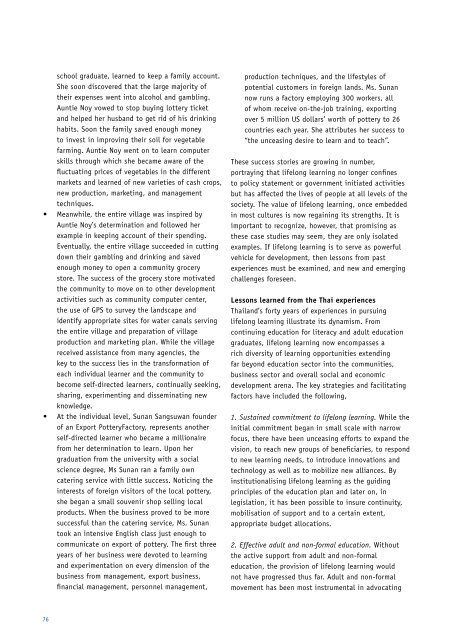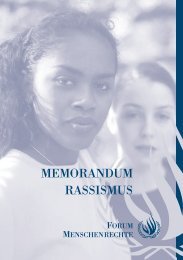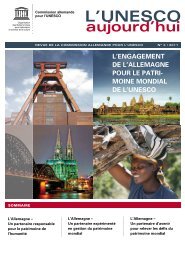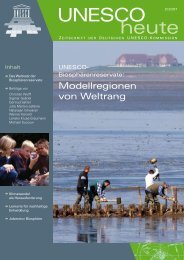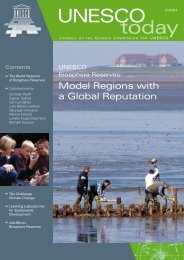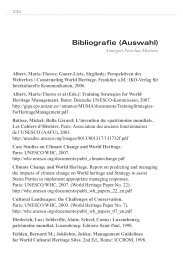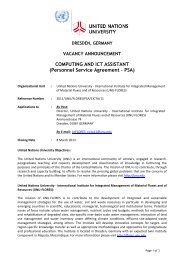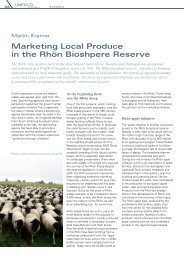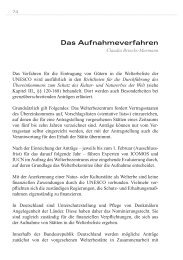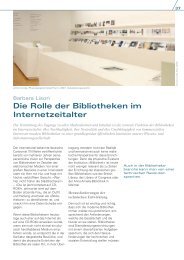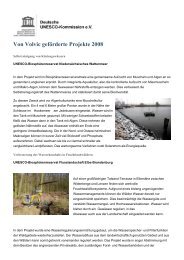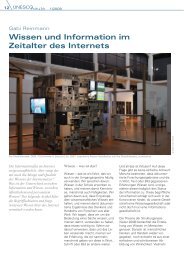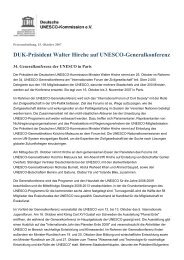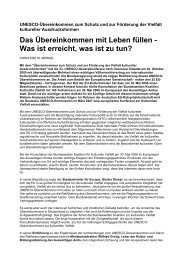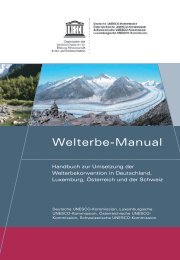CONFINTEA VI, final report - Unesco
CONFINTEA VI, final report - Unesco
CONFINTEA VI, final report - Unesco
You also want an ePaper? Increase the reach of your titles
YUMPU automatically turns print PDFs into web optimized ePapers that Google loves.
school graduate, learned to keep a family account.<br />
She soon discovered that the large majority of<br />
their expenses went into alcohol and gambling.<br />
Auntie Noy vowed to stop buying lottery ticket<br />
and helped her husband to get rid of his drinking<br />
habits. Soon the family saved enough money<br />
to invest in improving their soil for vegetable<br />
farming. Auntie Noy went on to learn computer<br />
skills through which she became aware of the<br />
fluctuating prices of vegetables in the different<br />
markets and learned of new varieties of cash crops,<br />
new production, marketing, and management<br />
techniques.<br />
• Meanwhile, the entire village was inspired by<br />
Auntie Noy’s determination and followed her<br />
example in keeping account of their spending.<br />
Eventually, the entire village succeeded in cutting<br />
down their gambling and drinking and saved<br />
enough money to open a community grocery<br />
store. The success of the grocery store motivated<br />
the community to move on to other development<br />
activities such as community computer center,<br />
the use of GPS to survey the landscape and<br />
identify appropriate sites for water canals serving<br />
the entire village and preparation of village<br />
production and marketing plan. While the village<br />
received assistance from many agencies, the<br />
key to the success lies in the transformation of<br />
each individual learner and the community to<br />
become self-directed learners, continually seeking,<br />
sharing, experimenting and disseminating new<br />
knowledge.<br />
• At the individual level, Sunan Sangsuwan founder<br />
of an Export PotteryFactory, represents another<br />
self-directed learner who became a millionaire<br />
from her determination to learn. Upon her<br />
graduation from the university with a social<br />
science degree, Ms Sunan ran a family own<br />
catering service with little success. Noticing the<br />
interests of foreign visitors of the local pottery,<br />
she began a small souvenir shop selling local<br />
products. When the business proved to be more<br />
successful than the catering service, Ms. Sunan<br />
took an intensive English class just enough to<br />
communicate on export of pottery. The first three<br />
years of her business were devoted to learning<br />
and experimentation on every dimension of the<br />
business from management, export business,<br />
financial management, personnel management,<br />
76<br />
production techniques, and the lifestyles of<br />
potential customers in foreign lands. Ms. Sunan<br />
now runs a factory employing 300 workers, all<br />
of whom receive on-the-job training, exporting<br />
over 5 million US dollars’ worth of pottery to 26<br />
countries each year. She attributes her success to<br />
“the unceasing desire to learn and to teach”.<br />
These success stories are growing in number,<br />
portraying that lifelong learning no longer confines<br />
to policy statement or government initiated activities<br />
but has affected the lives of people at all levels of the<br />
society. The value of lifelong learning, once embedded<br />
in most cultures is now regaining its strengths. It is<br />
important to recognize, however, that promising as<br />
these case studies may seem, they are only isolated<br />
examples. If lifelong learning is to serve as powerful<br />
vehicle for development, then lessons from past<br />
experiences must be examined, and new and emerging<br />
challenges foreseen.<br />
Lessons learned from the Thai experiences<br />
Thailand’s forty years of experiences in pursuing<br />
lifelong learning illustrate its dynamism. From<br />
continuing education for literacy and adult education<br />
graduates, lifelong learning now encompasses a<br />
rich diversity of learning opportunities extending<br />
far beyond education sector into the communities,<br />
business sector and overall social and economic<br />
development arena. The key strategies and facilitating<br />
factors have included the following,<br />
1. Sustained commitment to lifelong learning. While the<br />
initial commitment began in small scale with narrow<br />
focus, there have been unceasing efforts to expand the<br />
vision, to reach new groups of beneficiaries, to respond<br />
to new learning needs, to introduce innovations and<br />
technology as well as to mobilize new alliances. By<br />
institutionalising lifelong learning as the guiding<br />
principles of the education plan and later on, in<br />
legislation, it has been possible to insure continuity,<br />
mobilisation of support and to a certain extent,<br />
appropriate budget allocations.<br />
2. Effective adult and non-formal education. Without<br />
the active support from adult and non-formal<br />
education, the provision of lifelong learning would<br />
not have progressed thus far. Adult and non-formal<br />
movement has been most instrumental in advocating


